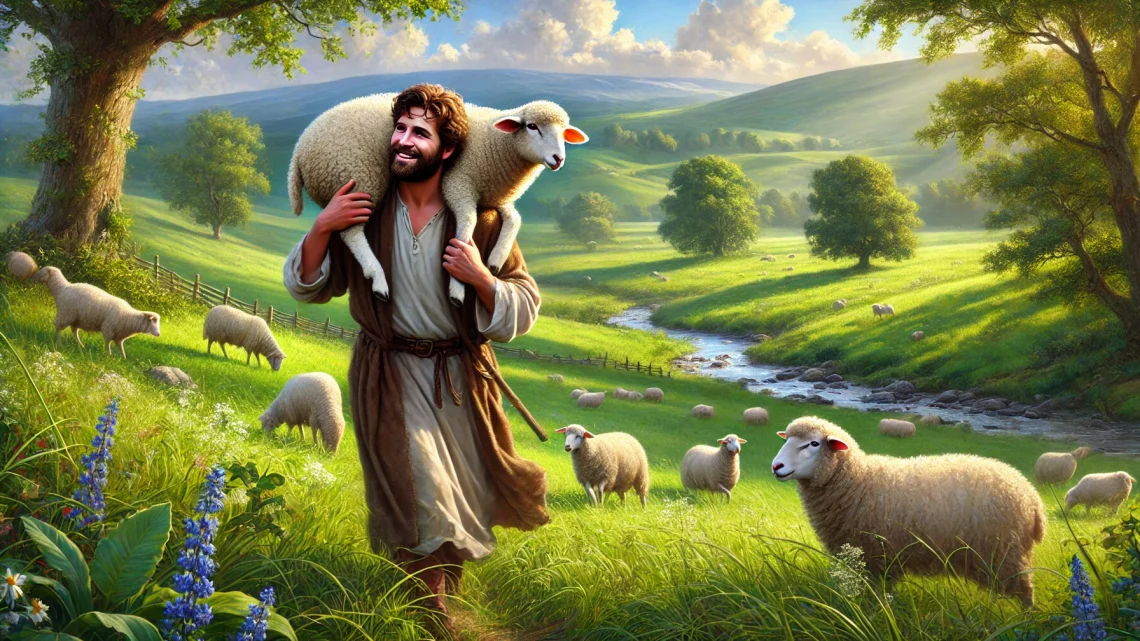The Parable of the Lost Sheep: Yehovah’s Unfailing Love


One of Yeshua’s most touching parables is that of the lost sheep. In Luke 15:3-7, Yeshua tells of a shepherd who leaves his ninety-nine sheep to find the one that is lost. This parable beautifully illustrates Yehovah’s relentless love and pursuit of each one of us, no matter how far we may have strayed.
The Context of the Parable
Yeshua shared the parable of the lost sheep in response to the Pharisees and teachers of the law who were murmuring about Him welcoming sinners and eating with them. They struggled to understand why Yeshua, who claimed to be a holy teacher, would associate with those they deemed unrighteous. Yeshua’s parable was a direct response to their hardened hearts and a revelation of Yehovah’s boundless grace and mercy.
In Luke 15:4-7, Yeshua said:
“What man of you, having a hundred sheep, if he has lost one of them, does not leave the ninety-nine in the open country, and go after the one that is lost, until he finds it? And when he has found it, he lays it on his shoulders, rejoicing. And when he comes home, he calls together his friends and his neighbors, saying to them, ‘Rejoice with me, for I have found my sheep that was lost.’ Just so, I tell you, there will be more joy in heaven over one sinner who repents than over ninety-nine righteous persons who need no repentance.”
The Shepherd’s Heart
In this parable, Yeshua portrays Himself as the shepherd and us as the sheep. The image of a shepherd was well-known in biblical times, representing care, guidance, and protection. But Yeshua added a deeper, more personal dimension to this role by emphasizing the shepherd’s active pursuit of the lost sheep.
A good shepherd does not simply wait for the lost sheep to find its way back. Instead, he takes the initiative to search for it. This relentless pursuit highlights three key aspects of the shepherd’s heart:
1. Compassion:
The shepherd’s heart is filled with compassion. He understands the vulnerability and danger that the lost sheep faces. It’s not just a matter of numbers; each sheep is valuable and irreplaceable. This mirrors Yehovah’s compassion for humanity. His love is not just for the masses, but for each individual.
2. Determination:
The shepherd’s pursuit is relentless and determined. He does not give up until he finds the lost sheep. This speaks to the unwavering commitment of Yehovah to reach out to us, no matter how lost we may feel. His love is persistent and tenacious, overcoming any barriers in its way.
3. Joy:
Upon finding the lost sheep, the shepherd’s immediate reaction is one of joy. He celebrates the recovery of the sheep, not alone, but with his friends and neighbors. This joy reflects the profound happiness in heaven when a sinner repents and returns to Yehovah.
The Value of the Individual
In a world that often measures worth by numbers and achievements, the parable of the lost sheep serves as a powerful reminder of the value Yehovah places on each individual. Every person is important and precious in His eyes. This inherent value is not contingent on our status, deeds, or righteousness, but is rooted in Yehovah’s unconditional love for us.
Consider the shepherd’s decision to leave the ninety-nine sheep in the open country. This act underscores the unique worth of the single lost sheep. To the shepherd, every sheep is irreplaceable. Likewise, Yehovah looks beyond our flaws and failures, seeing our intrinsic value as His beloved children.
The Joy of Restoration
The climax of the parable is the shepherd’s joy upon finding the lost sheep. This joy is not just personal but communal. He calls together his friends and neighbors, inviting them to share in his happiness. This collective celebration signifies the communal aspect of restoration and reconciliation.
In heaven, there is rejoicing over one sinner who repents. This heavenly joy is echoed in the community of believers when we witness someone turning back to Yehovah. It’s a shared celebration of love, grace, and the power of redemption.
Application in Our Lives
The parable of the lost sheep is not just a comforting story, but a call to action for believers. We are invited to embody the shepherd’s heart in our interactions with others. Here are some ways we can live out the lessons of this parable:
1. Extend Compassion and Grace:
Like the shepherd, we are called to show compassion and grace to those who are lost or struggling. This might mean reaching out to someone who feels isolated, offering support to a friend going through a difficult time, or simply being a listening ear to someone in need.
2. Pursue Relentlessly:
Just as the shepherd did not give up on the lost sheep, we are encouraged to be persistent in our efforts to help others find their way back to Yehovah. Whether it’s through prayer, acts of kindness, or gentle encouragement, our consistent efforts can make a significant difference in someone’s life.
3. Celebrate Restoration:
When we witness someone turning back to Yehovah, let us join in the heavenly celebration. Sharing in the joy of restoration strengthens our community and reaffirms our shared commitment to following Yeshua’s example of love and mercy.
Reflection and Contemplation
As we reflect on the parable of the lost sheep, let us take time to contemplate the following questions:
- How have I experienced Yehovah’s relentless love in my own life?
- Are there areas where I feel lost or in need of His guidance and compassion?
- How can I extend the shepherd’s heart to those around me who may be feeling lost or alone?
Through prayer and reflection, may we open our hearts to the boundless love of Yehovah and be inspired to share that love with others.
Conclusion
The Parable of the Lost Sheep is a powerful reminder of Yehovah’s unwavering love and dedication to each of us. No matter how far we may stray, He is always ready to seek us out and bring us back into His fold. As we take Yeshua’s teachings to heart, may we strive to emulate His compassion, determination, and joy in our own lives.
Let us carry forward the message of this parable, showing grace and love to those around us, and continually celebrating the restoration and redemption that come from our loving Shepherd.

